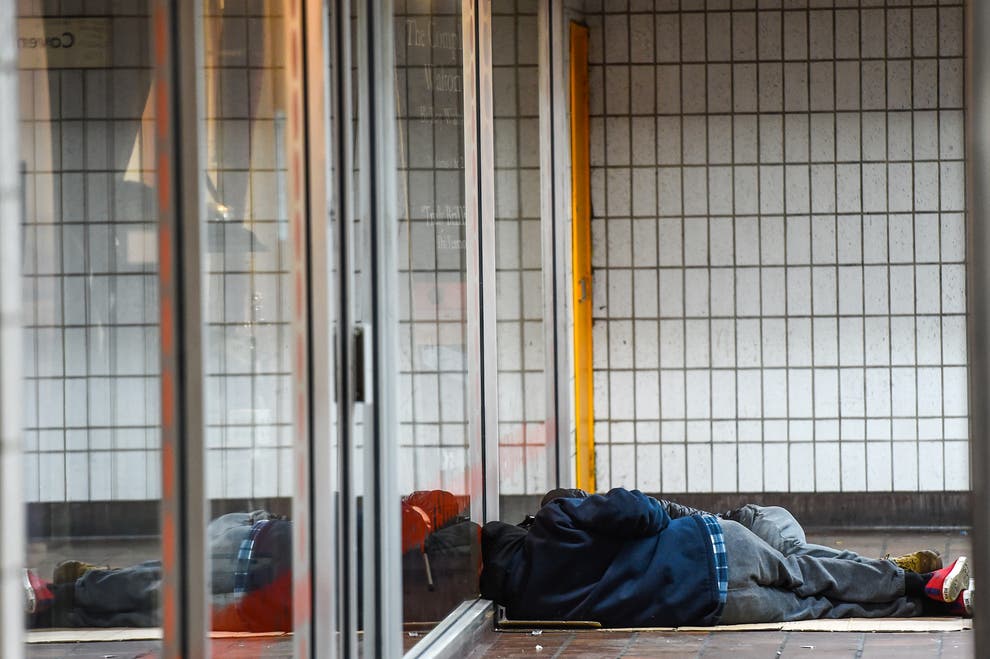Homeless people evicted from hotels and denied housing despite ministers’ claim emergency support is ongoing
Councils are facing legal action after vulnerable people were told to leave hotels with nowhere else to go. May Bulman reports


Homeless people are being evicted from emergency housing and denied support despite government claims that a scheme to keep people off the streets introduced at the start of the pandemic is ongoing.
A number of local authorities are facing legal challenges after vulnerable individuals, who cannot access state benefits due to their immigration status, were told to leave emergency housing or turned away when asking for homelessness support in apparent breach of government guidance.
The only option provided to many of these individuals has been to accept an offer of “voluntary return”, meaning they would be sent back to their home country, even if they have immigration status in the UK.
The Independent spoke to one man who said he felt suicidal after being told he had to leave the hotel he has been living in since March 2020 with nowhere else to go, due to the fact that his visa has a no recourse to public funds (NRPF) condition attached, meaning he cannot access benefits.
The Everyone In programme, introduced last March, required all councils to place rough sleepers into emergency housing such as hotels. In July, ministers said local authorities would be granted funding to “prevent those housed under the scheme from returning to the streets”.
Tens of thousands of people were subsequently housed, including a large number of immigrants with NRPF, which applies to nearly 1.4 million people in the UK.
The Ministry of Housing, Communities and Local Government (MHCLG) says the Everyone In scheme is “ongoing” and that “no one should find themselves back on the street” without “support to move forward”.
In March this year, the High Court ruled that councils could legally provide accommodation to individuals with NRPF for the duration of the pandemic.
Mohammed Bhuiyan, 33, who is in the UK on a visa with an NRPF condition attached, was housed in a hotel in Tower Hamlets last March after being evicted from his home because he was struggling to pay rent.
Despite ministers’ claims that the programme is ongoing, on 22 June, the Bangladeshi national received a letter from the council stating that he must leave the hotel by 2 August. His solicitor has since managed to extend his eviction notice to 11 August.
“I’m really scared. No one helps you unless you have recourse to public funds or your close family can help. I only have distant family here and they are struggling during this time so had to stop supporting me,” Mr Bhuiyan told The Independent.
“Where am I going to live? I have nowhere to go. I will be homeless. I feel helpless.”
Mr Bhuiyan, who arrived in the UK to study in 2009, was one of tens of thousands of migrants subject to accusations of cheating in English language tests in 2014 and subsequently told they had no right to stay in the UK, with no proper right to challenge the decision.
As a result, the 33-year-old, who has always pleaded his innocence, was unable to work for more than six years while he tried to argue his case through the courts. He was finally granted a visa in June, which gave him the right to work but with an NRPF condition attached.
Mr Bhuiyan currently works as an unpaid volunteer for the Metropolitan Police but said he was struggling to find paid work due to mental health issues he developed while trying to resolve his immigration case.
The eviction letter from Tower Hamlets council states that Mr Bhuiyan is “not eligible for housing assistance... due to [his] immigration status” and that the accommodation the council gave him was “only due to the Covid pandemic and was only due to be for a limited time”.
The council has told Mr Bhuiyan’s lawyer that if he is “compelled to sleep rough” he can “access the Home Office’s voluntary return programme”.
A letter from Mr Bhuiyan’s GP last month states: “His mental health situation is likely to deteriorate due to his current adverse housing situation i.e. being at risk of homelessness.”
Mr Bhuiyan said: “I’m feeling suicidal. I’m ready to go. I don’t want to live in this country or in this world.”
His lawyer, Derek Bernardi of Camden Community Law Centre, has taken legal action against the council arguing that the decision to evict him is unlawful on the basis that the government claims the Everyone In scheme is ongoing, and that the pandemic has not subsided.
Mr Bernardi said the government’s claim that Everyone In was ongoing was “contradicted by the reality faced by rough sleepers seeking emergency accommodation”.
He added: “I have had several clients with NRPF refused accommodation by multiple councils, all citing the supposed fact that Everyone In has ended or has somehow decreased in scope.
“I am seeing extremely vulnerable people not only struggling to cope with being homeless during a pandemic but also being denied basic assistance by their local councils.”
Mr Bhuiyan’s is not a unique case. Benjamin Morgan, of the Public Interest Law Centre, said he was aware of a number of cases of migrants being asked to leave housing provided through Everyone In with no offer of alternative support, or being told they will be put out on the street if they do not agree to return to their country of origin.
People are also being denied help in the first place. Dirghayu Patel, solicitor at Law Stop, said he had two clients who due to their immigration status had recently been denied housing support from their councils. One had just escaped from an abusive relationship and the other had health conditions which made them vulnerable to Covid.
“There’s still an emergency out there. Cases are rising and not everyone is vaccinated. To ensure an effective public health response, you can’t allow people to be on the streets,” Mr Patel said.
“It’s not clear what the government is expecting local authorities to do. There’s a lack of clear leadership from the top and a lack of resources provided.”
Jon Sparkes, chief executive of Crisis, said: “It’s vital that national and local government continue to provide safe accommodation for everyone experiencing homelessness regardless of where they were born or their immigration status.”
An MHCLG spokesperson said: “The work of Everyone In is ongoing. We’ve made huge progress to bring rough sleepers off the streets during the pandemic and this work continues.
“We have been clear with councils and partners that everyone helped into accommodation must be offered the tailored support they need to move forwards and that no one should find themselves back on the street without this.”
A Tower Hamlets Council spokesperson said: “Our policy is not to evict rough sleepers with or without recourse unless they are refusing to work with us on a move-on option.
“For a small number of those with NRPF who had nowhere to stay at the start of the pandemic, we continue to follow government guidance with regard to councils using their own judgement as to when and for how long to accommodate.
“We are continuing to provide accommodation to these individuals in line with public health guidance for as long as funding will allow. These clients are being supported to take up legal advice and being given a generous notice period to find accommodation.”






Join our commenting forum
Join thought-provoking conversations, follow other Independent readers and see their replies
Comments